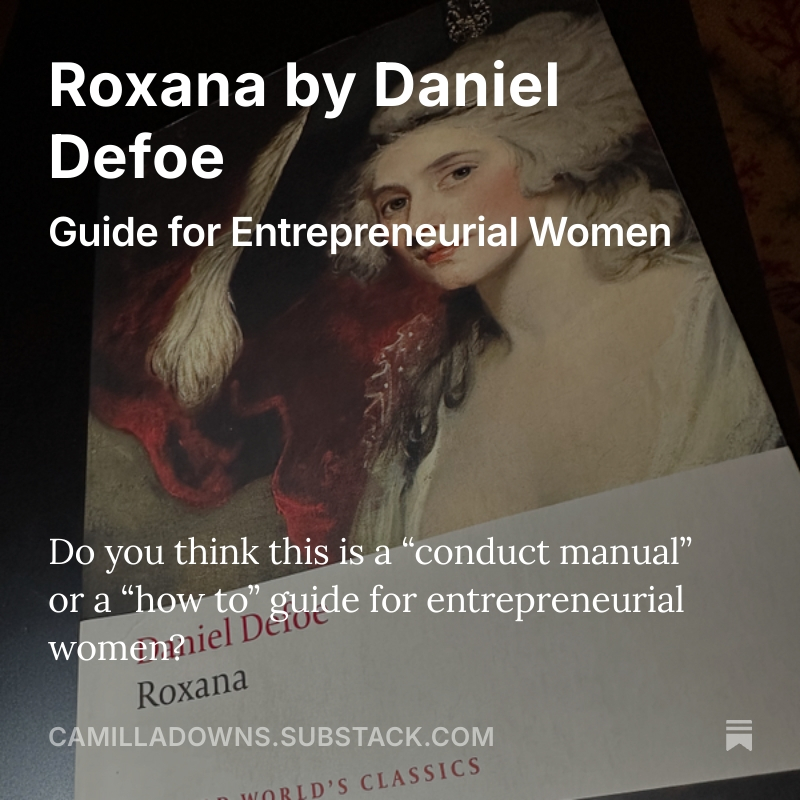April 6 2025
Do you think this is a “conduct manual” or a “how to” guide for entrepreneurial women?
If we want to twist the meaning of “conduct manual” to mean teaching a woman how to conduct herself in order to not be miserable, then it’s definitely a “conduct manual.” Ha! However, if not twisting the definition, then I say it is a “how to” guide for entrepreneurial women.
During the time of this novel, women were not allowed agency, not allowed to fully participate in the economy, nor the labor market. It was a full blown patriarchy. Roxana was in the position she was in due to the men in her life. First, her father married her off to a fool of a man. When her father died, he entrusted Roxana’s inheritance to her brother who lost it. And her fool of a husband abandoned her and their children, leaving only a small amount of money. Wollstonecraft writes that, “It would be an endless task to trace the variety of meannesses, cares, and sorrows, into which some are plunged ….. that they were created rather to feel than reason, and that all the power they obtain must be obtained by their charms and weakness” (The Enlightenment 174).
This leads Roxana to resort to the only capital she has, her charm and her body. I would say she learned the art of being opportunistic. However not in the bad sense of the word. She used what the men and young girls of society ingrained in them as put forth by de Beauvoir. “Many are the young girls … who dream of being the private spectacle, the playing, the licentious masterpiece of a mature man” (The Second Sex 392). She did so to survive, with perhaps a wee bit of selfishness. She may have taken it too far, but having lived through near starvation, not knowing how to pay for lodging and food; this surely propelled her further than she necessarily needed to be in relation to her wealth.
Roxana begins by telling the reader it is better to be an Old Maid than to marry a fool (Roxana 8). This would seem to be step one in the entrepreneurial guide. She then goes on to share how to be a woman entrepreneur if you unfortunately married a fool, and that fool abandons you to starve and suffer. First, one must find a relation or parish to care for the children. I personally am nauseous at the thought of this but we have choices now that were not available during Roxana’s time. We have agency, and thanks to feminism have made loads of progress.
Roxana’s husband’s brother-in-law agrees to take the children into their home (Roxana 23). Next, Roxana’s landlord begins to show kindness and generosity to her. She leans into this and into pleasing him for her and her maid’s survival. Their relationship had to remain secret as the landlord was married. Definitely not in good character for that time period, or I suppose any time period. Unless you’re in an ethical polyamorous relationship, that is. She no longer has to worry about food, clothing, and lodging. Once her landlord dies, she continues to move through relationships, using her body to survive and provide for herself and her maid, Amy.
Perhaps this book could have been titled, “How to Survive When You Marry a Fool”. I’m in a cheeky mood while writing this. I think our current state of affairs has me being a bit snarky.
On a side note, having to use one’s body in this nature may seem like a thing of the distant past. Perhaps not so. In 2006 when I divorced the fool I married in 1998, I experienced something a tiny bit similar. Absolutely everything was in my name. All assets, more importantly all debts; which far outnumbered the assets. I was left with a huge amount of debt, with he not helping with any of it. Until I could get on my feet, I allowed myself (my body) to be a part of the picture when he visited the kids because he gave me money for food and necessities. When I withdrew myself from those visits, he stopped visiting the kids and stopped with helping financially. I’m not proud of it. I hate that I did that. But a mother will do what she has to do to feed her kids and herself and to have a roof over their heads.
*This is a discussion question from my Women in Literature class at UNR. I love this class.

